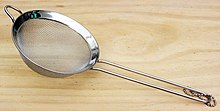sieve
Jump to navigation
Jump to search
See also: Sieve
English
[edit]
Etymology
[edit]From Middle English sive, syfe, from Old English sife, from Proto-West Germanic *sibi (“sieve”), from Proto-Indo-European *seyp-, *seyb- (“to pour, sieve, strain, run, drip”). Akin to German Sieb, Dutch zeef, Proto-Slavic *sito (Russian си́то (síto), сев (sev), се́ять (séjatʹ)).
Pronunciation
[edit]Noun
[edit]sieve (plural sieves)
- A device with a mesh, grate, or otherwise perforated bottom to separate, in a granular material, larger particles from smaller ones, or to separate solid objects from a liquid.
- A process, physical or abstract, that arrives at a final result by filtering out unwanted pieces of input from a larger starting set of input.
- Given a list of consecutive numbers starting at 1, the Sieve of Eratosthenes algorithm will find all of the prime numbers.
- 2010, Luke Mastin, “20TH CENTURY MATHEMATICS - ROBINSON AND MATIYASEVICH”, in www.storyofmathematics.com[1], retrieved 2013-09-08:
- Among, [sic] his other achievements, Matiyasevich and his colleague Boris Stechkin also developed an interesting “visual sieve” for prime numbers, which effectively “crosses out” all the composite numbers, leaving only the primes.
- (obsolete) A kind of coarse basket.[1]
- (colloquial) A person, or their mind, that cannot remember things or is unable to keep secrets.
- (medicine, slang, derogatory) An intern who lets too many non-serious cases into the emergency room.
- 1997, Leo Galland, The Four Pillars of Healing, page 25:
- To be a sieve was to lack clinical judgment, courage, and group loyalty all at once.
- (category theory) A collection of morphisms in a category whose codomain is a certain fixed object of that category, which collection is closed under precomposition by any morphism in the category.
Derived terms
[edit]- brain like a sieve
- Brun sieve
- head like a sieve
- larger sieve
- large sieve
- leak like a sieve
- memory like a sieve
- mind like a sieve
- molecular sieve, mole sieve, mol sieve
- Selberg sieve
- sieve cell
- sieveless
- sievelike
- sieve number
- sieve of Eratosthenes
- sieve plate
- sieve set
- sieve theory
- sieve-tube element
- sievish
- Turán sieve
Translations
[edit]device to separate larger objects from smaller ones or from liquids
|
process that filters out unwanted pieces of input
|
See also
[edit]Verb
[edit]sieve (third-person singular simple present sieves, present participle sieving, simple past and past participle sieved)
- To strain, sift or sort using a sieve.
- (sports) To concede; let in
- 2017 June 3, Daniel Taylor, “Real Madrid win Champions League as Cristiano Ronaldo double defeats Juv”, in The Guardian (London)[2]:
- This was their seventh defeat out of nine finals, including five in a row, and the second half was a chastening experience for the Serie A champions, culminating in them sieving more goals in one match than in the rest of the competition put together.
Translations
[edit]to strain, sift or sort using a sieve
|
- The translations below need to be checked and inserted above into the appropriate translation tables. See instructions at Wiktionary:Entry layout § Translations.
Translations to be checked
References
[edit]- ^ 1858, Peter Lund Simmonds, The Dictionary of Trade Products
Further reading
[edit]Hunsrik
[edit]| 70 | ||
| ← 6 | 7 | 8 → |
|---|---|---|
| Cardinal: sieve Ordinal: sibt | ||
Etymology
[edit]Inherited from Central Franconian sivve, from Middle High German siben, from Old High German sibun, from Proto-West Germanic *sebun, from Proto-Germanic *sebun.[1]
Cognate with German sieben and Luxembourgish siwen.
Pronunciation
[edit]Numeral
[edit]sieve
- seven
- Das sin schun sieve Uher.
- That's already seven o'clock.
References
[edit]- ^ Piter Kehoma Boll (2021) “sieve”, in Dicionário Hunsriqueano Riograndense–Português (in Portuguese), 3rd edition, Ivoti: Riograndenser Hunsrickisch, page 151
Categories:
- English terms inherited from Middle English
- English terms derived from Middle English
- English terms inherited from Old English
- English terms derived from Old English
- English terms inherited from Proto-West Germanic
- English terms derived from Proto-West Germanic
- English terms derived from Proto-Indo-European
- English 1-syllable words
- English terms with IPA pronunciation
- English terms with audio links
- Rhymes:English/ɪv
- Rhymes:English/ɪv/1 syllable
- English lemmas
- English nouns
- English countable nouns
- English terms with usage examples
- English terms with quotations
- English terms with obsolete senses
- English colloquialisms
- en:Medicine
- English slang
- English derogatory terms
- en:Category theory
- English verbs
- en:Sports
- English terms with mixed convergence
- en:Tools
- Hunsrik terms inherited from Central Franconian
- Hunsrik terms derived from Central Franconian
- Hunsrik terms inherited from Middle High German
- Hunsrik terms derived from Middle High German
- Hunsrik terms inherited from Old High German
- Hunsrik terms derived from Old High German
- Hunsrik terms inherited from Proto-West Germanic
- Hunsrik terms derived from Proto-West Germanic
- Hunsrik terms inherited from Proto-Germanic
- Hunsrik terms derived from Proto-Germanic
- Hunsrik 2-syllable words
- Hunsrik terms with IPA pronunciation
- Rhymes:Hunsrik/iːvə
- Rhymes:Hunsrik/iːvə/2 syllables
- Hunsrik lemmas
- Hunsrik numerals
- Hunsrik cardinal numbers
- Hunsrik terms with usage examples